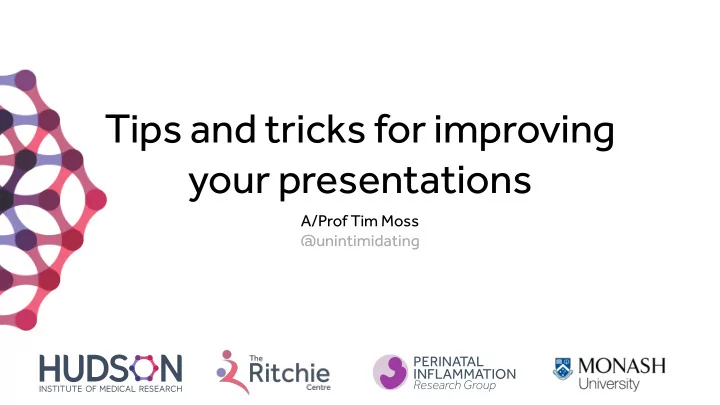

Tips and tricks for improving your presentations A/Prof Tim Moss @unintimidating PERINATAL INFLAMMATION Research Group
My pedigree • 1996 ‘Young Investigator Prize’, Australian Perinatal Society • 20 years’ worth of conference presentations; free communications and invited presentations • 2-week ‘boot camp’ at the Alan Alda Centre for Communicating Science , New York (winner of presentation prize)
What makes a good presentation? Notes from session 1 • Time for people to think • Enthusiasm • Flow of the slides • Something for them to think • Know your audience about • Consistency • Knowing your presentation • Short • End with a question not an • Purpose answer • Within the time limit • Clear slides - not too busy • Logical • Involve the audience/ • Limited engagement • Co ff ee • Pitch change - not monotone • Pictures & videos • Entertaining • Personal • Not too many slides • Humour • No slides
What makes a bad presentation? Notes from session 1 • Reading powerpoint • Um and ahhhh • Overuse of the laser slides • Speaker was sitting down • “as you can see” • Reading o ff a script • Small fonts, can’t read it • Going overtime • Lack of eye contact • Graphs can’t be read • T • T oo many slides oo much information • Talking to yourself per slide • Going back through • Boring/monotone • Speaking too quickly slides • When they don’t point to • Bad colours • Lack of purpose/ the slide summary
What makes a good presentation? Notes from session 2 • engagement • pictures • tell a good story • enthusiastic • appropriate language • signi fi cance for audience • voice • simplicity • scope • not too much text • text lge enough to • topical/relevant read • good graphic • good examples • humour/coolness • con fi dence • logical formatting • interaction with slides • projection
What makes a bad presentation? Notes from session 2 • bad colours • reading o ff slides • poor pronunciation • overuse of pointer • too much/not • monotone enough animation • acronyms/assumed knowledge • too fast/quiet • going over time • not focusing on • boring/too much audience text
Connect with your audience
Have a purpose • Why am I talking to these people? • What do they want or need from me? • What do I want them to get from me? • What one thing do I most want them to remember?
Tell a story
Climax Build-up of tension Consequences Conflict Resolution Story arc
So what?
Leave things out
Use metaphors
Beware the curse of knowledge
Use direct, everyday language
Use ‘Assertion-Evidence’ slide design 3 2 Score ratio 1 0
Even if you are the only one talking, you are still having a conversation
Recommend
More recommend